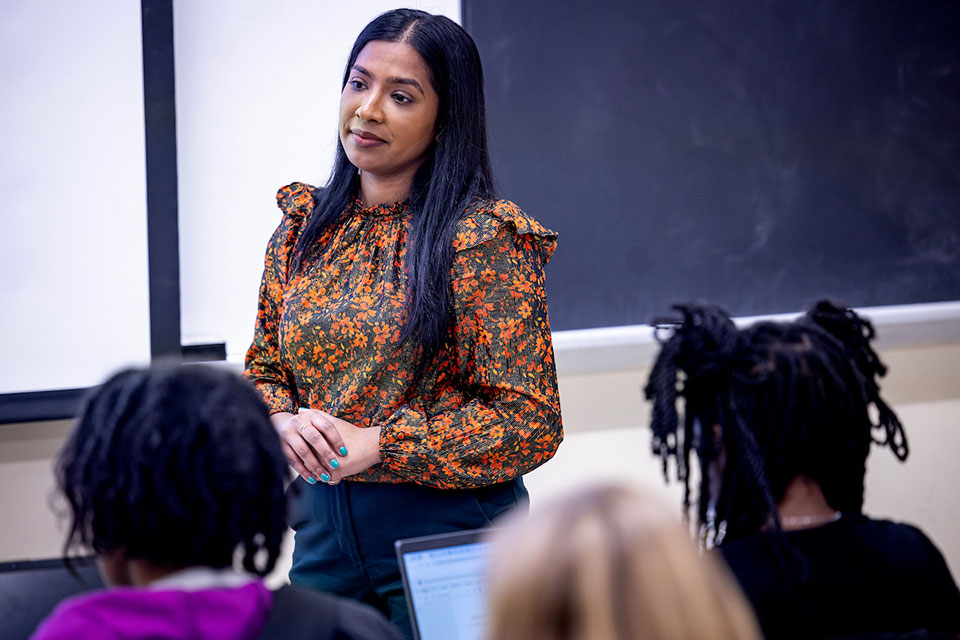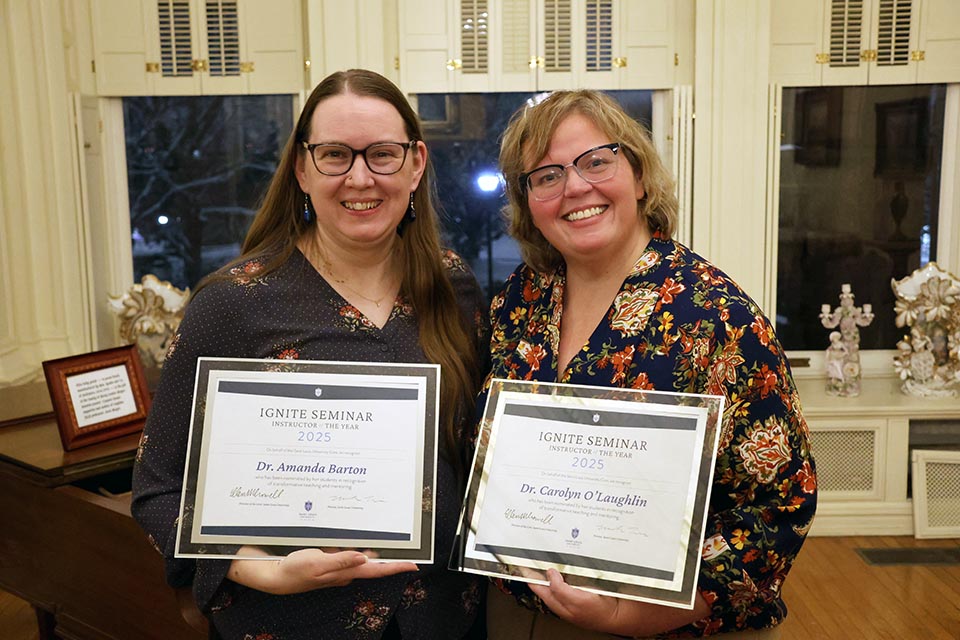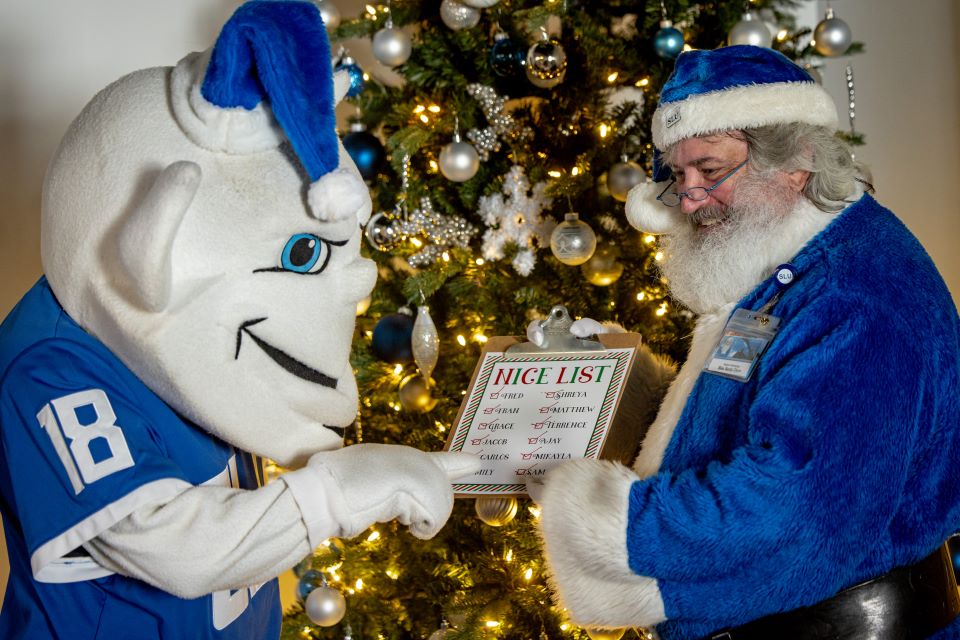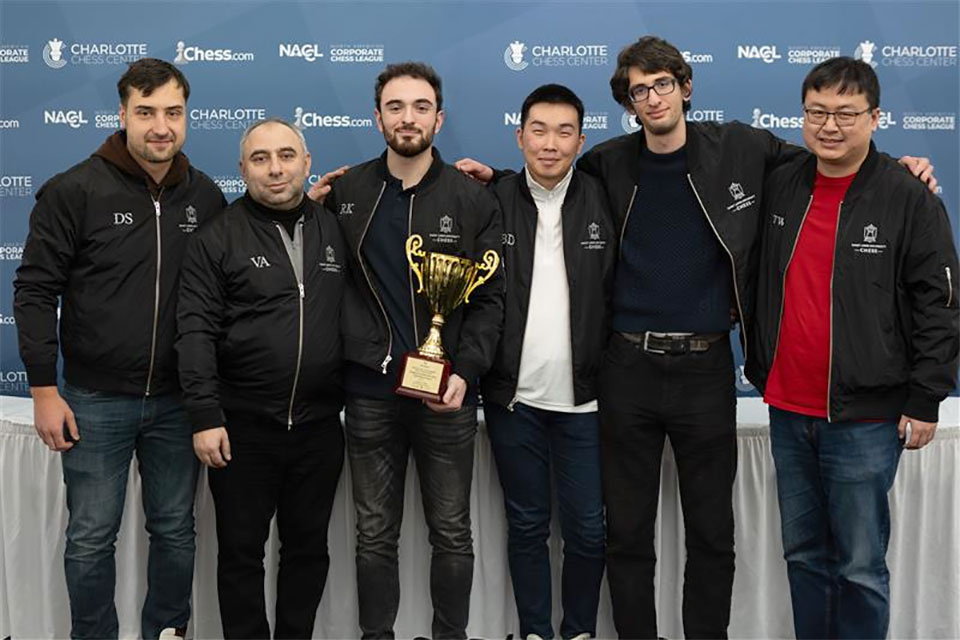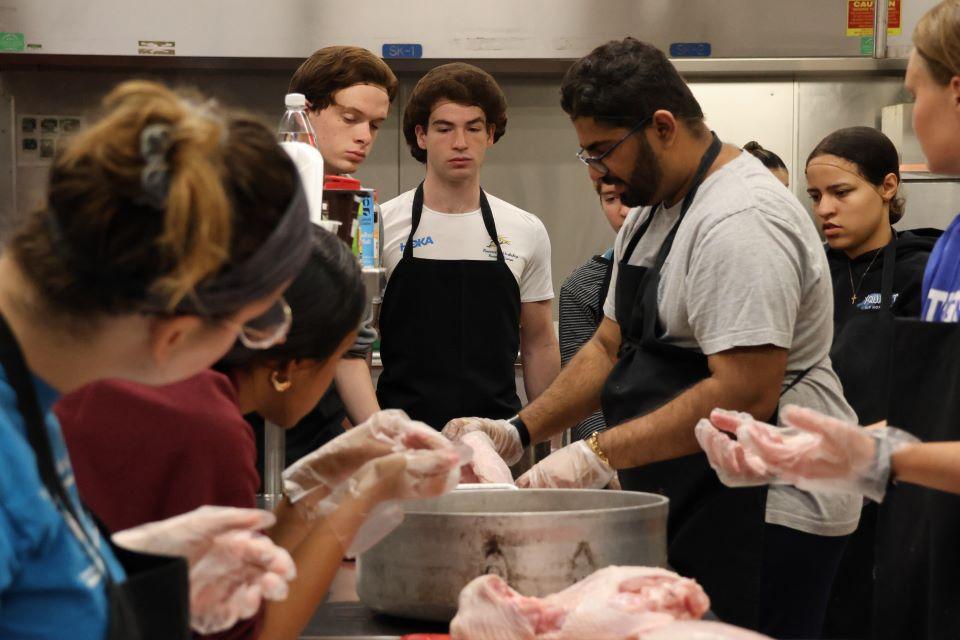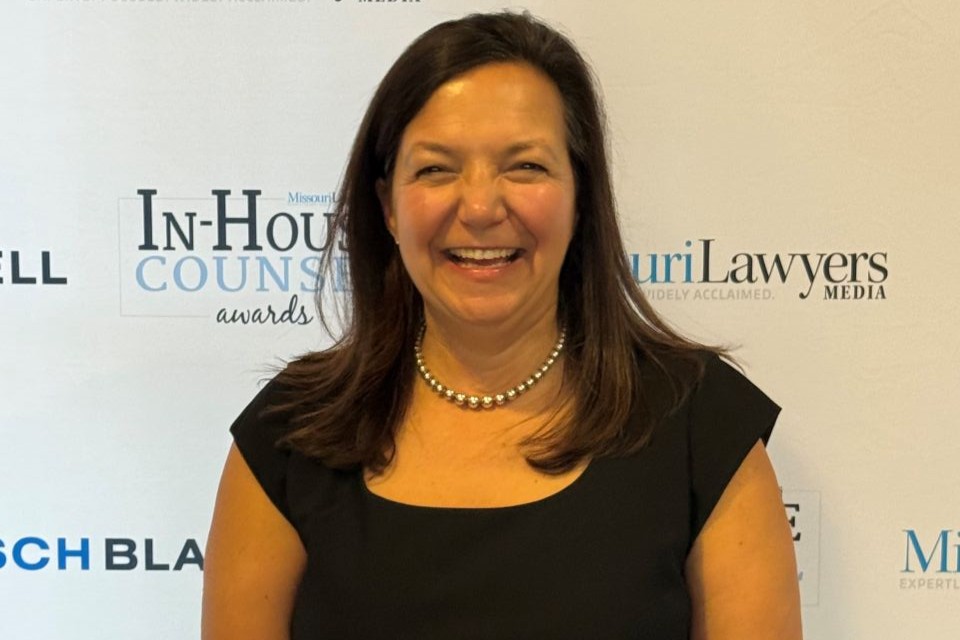Saint Louis University Staff, Faculty Participate in Civil Rights Immersion Trip
Supported by the Office of Mission and Identity, Saint Louis University employees recently participated in a Civil Rights immersion trip. The group of nine, led by Patrick Cousins, pastoral formation director in Mission and Identity, took a road trip from SLU’s campus in St. Louis to sites in Tennessee, Alabama and Georgia after the spring semester ended.
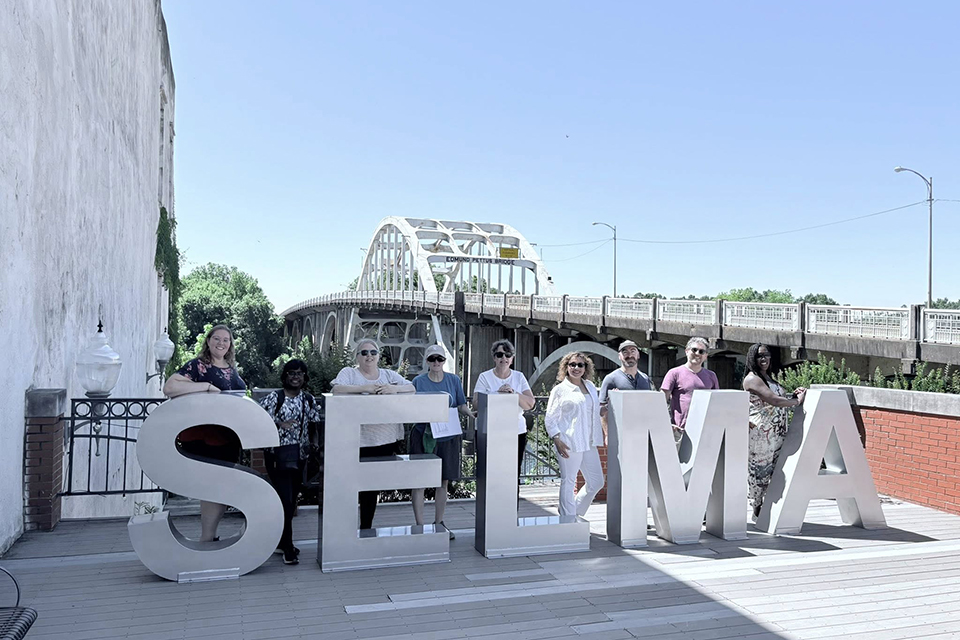
SLU's Civil Rights immersion trip visited Selma, Alabama. Submitted photo.
“This was something I’ve wanted to do for a while,” Cousins said. “I have led trips to the Navajo Nation in the past. Marquette had done something similar, taking a group along the Civil Rights Trail, and I wanted to be able to do that here at SLU.”
Jessica Trout, assistant director of advocacy and civic engagement in the Center for Social Action, was one of the participants.
“This is my second trip with Mission and Identity,” Trout said. “The Navajo Nation was very spiritual and brought me closer to nature. The Civil Rights trip was powerful and inspired me to want to act, keep learning, and reminded me of important concepts applicable today. Both were vital to my personal, professional, and spiritual growth. I am grateful for the opportunities Mission and Identity and SLU provide. I would encourage staff and faculty to attend these trips and supervisors to support them in doing so as they build bridges between departments and encourage professional and personal growth.”
Cousins put out a call for interested participants and quickly had enough applications for the first cohort. The group included seven staff and two faculty members. The group drove from SLU’s campus to Memphis, Tenn., from Memphis to Birmingham, Selma, and Montgomery, Alabama, and then on to Dalton, Georgia, and Nashville, Tenn.
“It was stellar,” Cousins said. “The group didn’t know each other well before leaving SLU but we forged a real bond during this trip.”
The group started at the National Civil Rights Museum at the Lorraine Motel, where Martin Luther King, Jr. was assassinated in 1968, and then to Clayborn Temple, the site of a sanitation workers strike that was instrumental in the fight for civil rights.
“The Clayborn suffered a devastating fire on April 28,” Cousins said. “This historic Black church was in ruins.”
“This trip was a journey through history, humanity, and the deepest parts of my own spirit,” said Esmeralda Aharon, program director of faculty, staff and community engagement in the Office of Ignatian Mission in Medicine. “This was not simply an academic exercise; it was a living, breathing encounter with the legacies of those who marched, sat, stood, and resisted in pursuit of justice. We often read about the Civil Rights Movement in textbooks, but walking through the museums, touching the soil, standing before sacred markers, and retracing the paths of giants turned that abstract history into a lived memory I now carry in my bones.”
Once in Birmingham, the group visited the Civil Rights Institute and explored sculpture parks dedicated to art depicting some of Birmingham’s history.
Each site was a reminder that justice is not an idea; it is a practice. And that practice is far from over.”
Esmeralda Aharon, Office of Ignatian Mission in Medicine
David Brinker, director of SLU’s Museum of Contemporary Religious Art (MOCRA), said the visit impacted him personally and professionally.
“A significant number of our stops were at museums and naturally, I was paying attention to the content but also to the manner of presentation. There were different approaches, but they all highlighted personal narratives of people who lived through those turbulent decades. And not just the well-known figures, but countless individuals who made a choice to get involved, often at great personal cost,” Brinker said. “Oral histories, letters and telegrams, personal effects, and proximity to sites still charged with the memory and blood of those whose lives were claimed by racist violence—all these elements and more, layered and echoing at each successive stop along our way, impressed upon me that the struggle against racism and for justice is not an abstraction or a grand milestone of the past, but an ongoing effort made in each moment.”
Brinker said the trip also brought him back to an exhibit MOCRA put on in 2002, dealing with the legacy of the Tuskegee Syphilis Study.
“We were honored to welcome civil rights attorney Fred D. Gray to campus to speak about his work representing the men in the study. We recorded his talk, and recently I spoke with Mr. Gray to get his permission to share that talk on our MOCRA Voices platform. Now in his 90s, Mr. Gray is still practicing law and working to ensure the legacy of previous generations of civil rights activists,” Brinker said. “I smiled each time I encountered Mr. Gray along the way at a museum or historic marker, most prominently for representing Rosa Parks and Martin Luther King, Jr.
“But Mr. Gray engaged in in almost every major civil rights case in Alabama, representing freedom riders, sit-in demonstrators, and students seeking to desegregate public schools. He filed the federal lawsuit that led to protection for the Selma-Montgomery march, which helped to secure passage of the Voting Rights Act of 1965. He was never front-and-center in these watershed moments, but he was consistently present, using his legal skills to support the movement in the way he best could. I take his example as inspiration and challenge to show up consistently and offer my best for the work we share.”
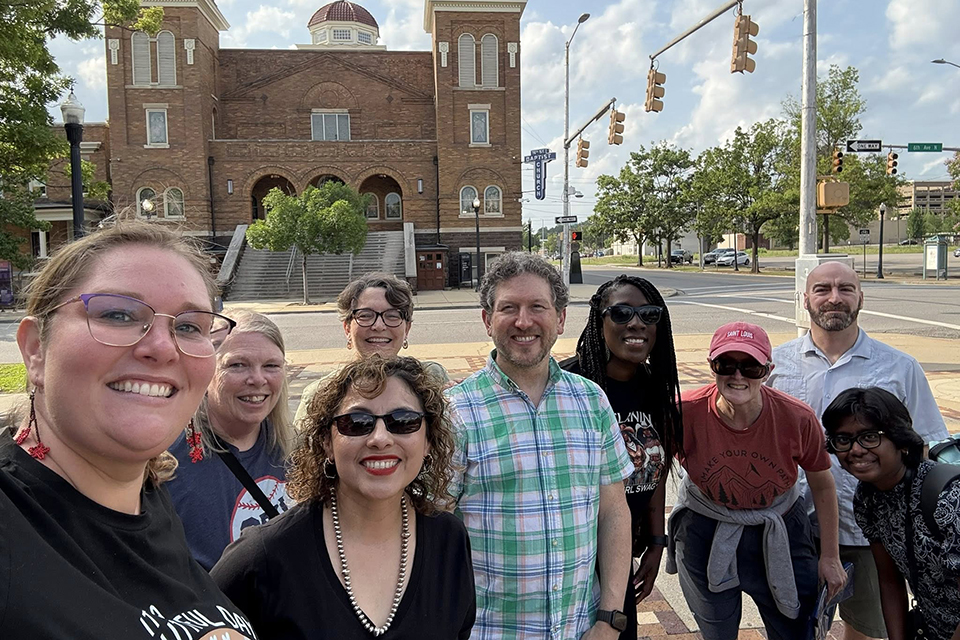
Participants in SLU's Civil Rights immersion trip. Submitted photo.
In Selma, the group visited The Coffeehouse, a formerly segregated diner now run by a Black woman, and crossed the Edmund Pettus Bridge together. Cousins noted members of the group held hands as they crossed.
“I walked across the Edmund Pettus Bridge, where courageous souls once risked everything for the right to vote. With 'We Shall Overcome' echoing in my mind and tears streaming down my cheeks, I felt the weight of their sacrifice and the urgency of continuing their fight,” Aharon said. “I sat beside the statue of Rosa Parks and let the silence between us speak volumes. I stood in the shadows of churches, sculptures, and buses where the movement took root and found its voice. Each site was a reminder that justice is not an idea; it is a practice. And that practice is far from over.”
Each evening the group met to reflect on the day’s events, a practice Cousins likens to an Ignatian Examen.
“We would gather together to talk about what we saw and what we were thinking,” he said. “Then we would talk about how this impacts what we do at SLU.”
Cousins noted St. Louis’ own place in the history of Civil Rights in the United States and said he was looking at ways to highlight local opportunities for learning for the SLU community.
“This group keeps getting together since we returned,” Cousins said. “We’ve already had discussions about ways to join with others to keep up the work.”
Aharon said the experience was revelatory.
“This experience deepened my understanding of resilience, community, and the moral courage required to sustain both,” Aharon said. “It affirmed my responsibility as a Latina, as a scholar, as a servant-leader to carry forward the work of equity and inclusion in every space I inhabit. This pilgrimage awakened my spirit and renewed my commitment to advocate for civil rights in our time.”
The trip was underwritten by the Office of Mission and Identity and the Division of Diversity and Innovative Community Engagement (DICE). Cousins said he hopes to be able to offer a second pilgrimage next spring.
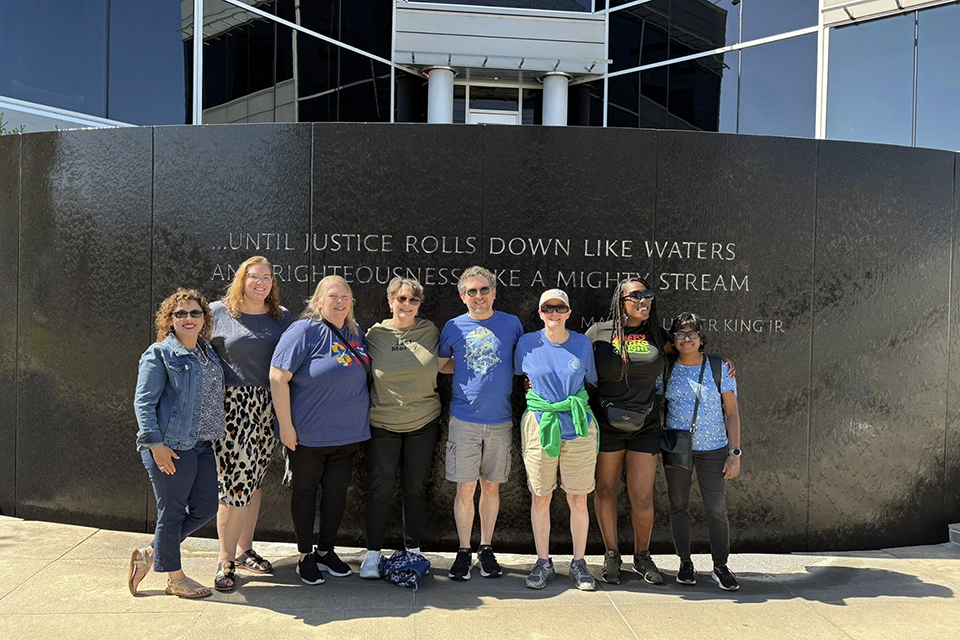
Staff and faculty participants in SLU's Civil Rights immersion trip. Submitted photo.
About Saint Louis University
Founded in 1818, Saint Louis University is one of the nation’s oldest and most prestigious Catholic research institutions. Rooted in Jesuit values and its pioneering history as the first university west of the Mississippi River, SLU offers more than 15,300 students a rigorous, transformative education that challenges and prepares them to make the world a better place. As a nationally recognized leader in research and innovation, SLU is an R1 research university, advancing groundbreaking, life-changing discoveries that promote the greater good.
Latest Newslink
- SLU Commits up to $1.5 Million to Support Local Students Pursuing Social Work and Criminal Justice CareersThe new initiative — representing a commitment of up to $1.5 million in scholarship support over the next several years — is designed to strengthen the region’s social work and criminal justice workforce by expanding college access for talented local students.
- University Core Honors Ignite Seminar InstructorsTwo Ignite Seminar instructors have been recognized with the 2025 Ignite Instructor of the Year Award. At a ceremony Tuesday night in Cupples House, Carolyn O'Laughlin, Ph.D. (Education) and Amanda Barton, Ph.D. (RISE Counselor) were honored by the University Core after being nominated by students in their Ignite Seminars.
- Sharing Throughout the Season: Ways to Give Back at SLUThis holiday season, Saint Louis University is highlighting organizations that could benefit from the gift of time or donations, including the University's annual Blue Santa toy drive.
- SLU Wins Collegiate Chess League Back-to-Back SeasonsThe SLU Chess Team won back-to-back Collegiate Chess League titles, securing the Fall 2025 season championship. This win is SLU's fifth Collegiate Chess League title in the last six seasons.
- TurkeyPalooza Food Drive Helps Provide a Thanksgiving Meal to Individuals, Families in NeedTurkeyPalooza, the annual Campus Kitchen food drive and Thanksgiving food prep event, resulted in 200 individual Thanksgiving meals and 40 meal-prep boxes for families in the St. Louis community.
- Saint Louis University's Moore Honored by Missouri Lawyers WeeklySenior Associate General Counsel Christina Moore, J.D., has been recognized by Missouri Lawyers Weekly for her work as in-house counsel at a non-profit or government organization. Moore (Law '02) was honored at the In-House Counsel Awards, an event designed to recognize attorneys from different sectors for their contributions and work.








